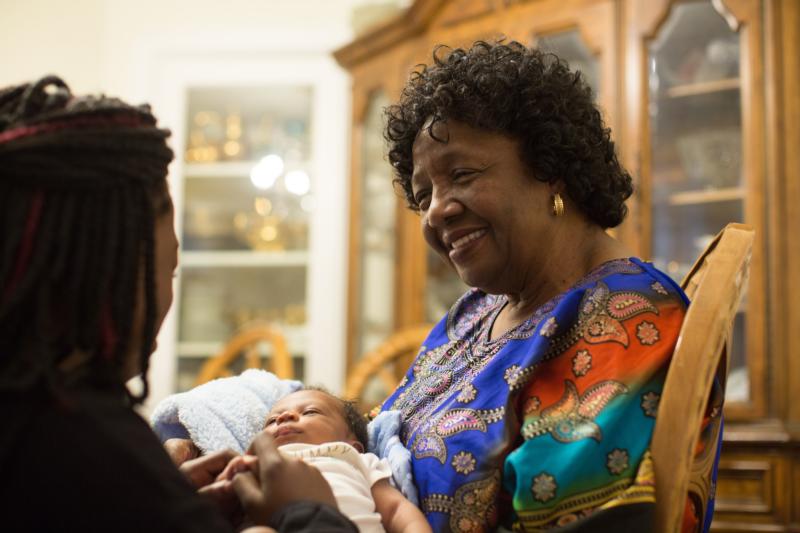
Sharonell Fulton, a foster parent for archdiocesan Catholic Social Services (CSS), is pictured with a young woman and child in a May 23, 2018, photo. Following a Supreme Court decision that reversed the city of Philadelphia’s suspension of foster care placements with CSS, the archdiocesan agency is now rebuilding its foster care program. (CNS photo/courtesy Becket Religious Liberty for All)
A recent financial settlement with the City of Philadelphia is helping an archdiocesan agency to restart a longtime ministry to vulnerable children.
Early in October, the city agreed to pay $56,000 to Catholic Social Services (CSS), along with a reported $1.95 million in legal fees to the Becket Fund for Religious Liberty, which represented the agency in a Supreme Court case on foster care placements managed by faith-based organizations.
In June, the high court unanimously ruled the city’s March 2018 suspension of its foster care placement contract with CSS violated the free exercise clause of the First Amendment of the U.S. Constitution.
[hotblock]
The legal action originated with the city’s move to freeze all new foster care placements with CSS due to the agency’s policy of not placing children with same-sex or unmarried couples. Such unions contravene church teaching on marriage, which holds the sacrament of matrimony is reserved only to one man and one woman.
Traditionally, CSS – which traces its roots to child welfare ministries established in 1797 – has deferred referrals involving same-sex foster parents to other approved agencies for placement.
The Philadelphia Archdiocese, represented by Becket, filed suit shortly after the referral freeze, and the case eventually made its way to the nation’s highest court.
The settlement funds, approved by the U.S. District Court, will enable CSS to reinvigorate a crucially needed mission, said James Amato, archdiocesan secretary for Catholic Human Services.
“We’re building the program back up,” said Amato. “In the past month, we’ve hired two new case managers, and we’re actively involved in recruiting foster parents.”
According to the city’s Department of Human Services, more than 5,000 children and youth are in Philadelphia’s foster care system at any point in time. The Philadelphia Archdiocese is “grateful that our ministries can continue serving those who count on us, especially foster children in need of a loving home,” said chief communications officer Kenneth Gavin.
Restarting that effort will take an investment, since the agency must assume all costs for “building the base” of its foster care program, said Amato.
CSS does not get paid for “anything we do in terms of recruitment, training or home studies,” site visits to verify if prospective foster parents can provide appropriate levels of care, said Amato.
Such visits include “a review of the family’s composition, the condition of the home and the family’s resources,” along with an examination of applicants’ “motivation for seeking to become a foster parent,” he said.
While CSS’s 2022 foster care contract with the city specifies an amount of $350,000, Amato clarified that total is contingent on the actual number of children served.
“We’re going to have deficit first year,” he said, noting CSS is looking to address any gaps with funds from the annual Catholic Charities Appeal.
Despite the challenges, Amato and his team are committed to “putting resources into a foundational mission program.”
“I’ve spent over 40 years of my career in child welfare,” said Amato. “To see us reemerging as a foster care provider is exciting and gratifying, and we look forward to serving the children.”
PREVIOUS: Local pro-life advocates gather to pray for Supreme Court case on abortion
NEXT: At Advent gathering, ancient prayer speaks to ‘what’s happening today’



Share this story